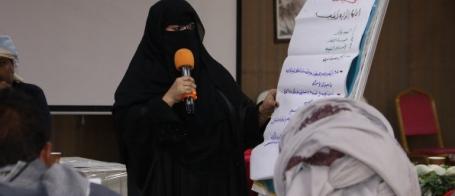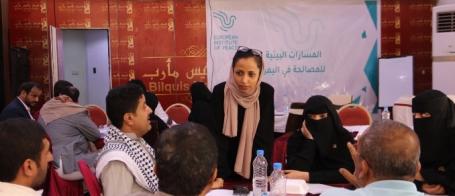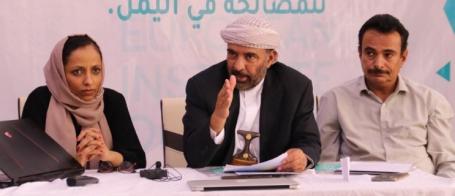Voices from Yemen – How environmental dialogues can contribute to resilience and peace

Amid mounting climate- and environmental- risks in Yemen, the European Institute of Peace (EIP) is streamlining climate considerations into local and national peacebuilding efforts. Through inclusive consultations and dialogues, the project is contributing to local peacemaking now and helping to establish a foundation for sustainable national reconciliation in the long term.
Conflict, climate change, and governance gaps are eroding Yemen’s environment
A decade of severe conflict in Yemen has led to widespread environmental destruction, reducing the quality and quantity of natural resources that many Yemenis depend on. Intensive military offensives, including attacks on oil, gas, and water infrastructure and the planting of mines in farmlands have caused severe environmental deterioration, posing critical threats to the many Yemenis relying on agricultural land, water, fisheries, and forests to earn a living.
The crisis has also deepened public management gaps, a long-standing problem in Yemen. Yemen is now divided between two territories, with the Internationally Recognised Government of Yemen (IRGY) holding the South, and the Houthi administration holding the North, where around 71% of the population live. Neither administration is able to implement environmental policies or regulate natural resource use. Unsustainable livelihood practices have flourished in the absence of government control, particularly overfishing and over-extraction of groundwater resources. Yemen is heading into a severe water crisis, with a risk of groundwater reserves drying completely in the next 20-25 years. Currently, Yemenis receive just 74 m³ of water per capita every year, the lowest water supply globally. Climate change is driving these dynamics to extremes. Extreme weather events are occurring more often and more severely, droughts are getting longer, and Yemen’s mean annual temperature is increasing at approximately twice the rate of the global average.
Al-Mahra has been hit by severe cyclones and floods, such as Cyclone Luban in 2018 and Cyclone Tej in 2023. These cyclones were devastating by all measures, killing and injuring many people and destroying numerous homes in the districts of Haswain, Al-Ghaydah, and Al-Masilah. To this day, we have not recovered from the damage caused by these cyclones, and the authorities have not been able to repair the damaged infrastructure and roads. Also, the affected people have not been compensated. We don't even have an early warning centre to notify us before disasters strike. We were informed by Oman in those previous instances.
- Khadija Wahan, Deputy Assistant Governor in Al-Mahra Governorate

Yemenis urge action on addressing climate and environmental challenges
Yemenis are very much aware of and concerned about these challenges and how they contribute to tensions and even new conflicts in the country. A comprehensive consultation by the European Institute of Peace (EIP) with 2,463 participants across Yemen’s North and South found that 70% of participants feel the impact of environmental degradation and climate change in their daily lives. Given that 80% of respondents depend on the environment and natural resources for their livelihoods, these impacts are particularly dangerous. Already, more than 50% of respondents have experienced tensions or conflicts related to environmental issues first-hand, with violent conflict emerging over water access, land use and pollution across the country.
These voices highlight the severity of the situation and the need for immediate solutions. Over 85% of respondents believe that addressing environmental and climate issues is an urgent priority, and 60% support their integration into conflict resolution strategies. However, most Yemenis are unaware of environmental governance frameworks and the actors that could address environmental problems causing tensions and conflict.
Governmental policies and laws governing various sectors in Yemen are not rising to the level of the catastrophe the country is facing. In fact, there is a general sense among participants that these legislations do not offer real or sustainable solutions.
- Suaad Al-Salahi, mediator and local project lead, European Institute of Peace

Community dialogues on environmental challenges pave the way for peace
To address these issues, EIP is implementing a set of Environmental Peacemaking Community Dialogues on environmental and climate risks that are being aggravated by hampered resilience after years of conflict. These dialogues are taking place in Marib, Aden, Taiz, Mocha, Hadramawt, and Al-Mahra as part of the Weathering Risk Peace Pillar.
The initiative provides a space for discussing shared climate and environmental challenges and exploring sustainable solutions to help strengthen the local social fabric. The dialogues also promote cooperation between communities and authorities, addressing environmental governance challenges and enhancing community engagement. The dialogues are bringing people together that can begin to address climate and environmental risks but may have been prevented from meeting to discuss these issues by the effects of conflict. From this, the dialogues help to bridge different groups, including tribal sheikhs, business owners, governing officers and civil activists, creating an inclusive and diverse space to build trust by cooperatively finding solutions to shared environmental issues.
Climate change has caused chaos in the universe, and we must move towards a culture of dialogue, as this culture is the prelude to solving our problems. Through community dialogue, we can resolve issues, whether related to the environment or the conflicts and disputes that disrupt social peace and result in negative social consequences. Unfortunately, in the past ten years, we have suffered from wars tied with numerous challenges, and we are going through difficult economic conditions caused by desertification and environmental imbalances. Notably, droughts [have] affected all sectors, whether agricultural or economic, leading to limited income. Marib is one of the Yemeni governorates most affected by climate change and its impact on the environment, such as drought, desertification, and the scarcity of groundwater. In districts like Harib and Al-Jubah, as well as Al-Wadi District, digging a well now requires reaching a depth of 300 meters. Through these community dialogues, which we consider the starting point for a local roadmap to peace and maintaining social security and safety, we must come out with a unified vision that is implemented with the people, in the ground, in the governorate, rather than just be written on papers that fade into oblivion.
- Mr Abdullah Al-Bakri, Deputy Governor of Marib and Tribal Leader

Raising local Yemeni voices to the highest political level
Despite the urgency of addressing environmental and climate risks, amid war and political turmoil, most national discussions overlook these risks and their security implications. After two years of groundwork, engaging locally with thousands of Yemenis to hear their voices, perceptions and needs regarding environmental issues, conflict risks, and peace solutions, EIP is now working with national actors, main parties to Yemen’s conflict.
EIP’s efforts aim to ensure that climate and environmental issues that undermine livelihoods and spark conflict are addressed in Yemen’s search for peace. To this end, EIP is working to bring local priorities to national decision-makers, sharing actionable recommendations to strengthen resilience against climate- and environment-related conflict risks. In addition, EIP is facilitating discussions with Yemeni administrations, including the Internationally Recognized Government of Yemen (IRGY) and the Southern Transitional Council (STC), to find common ground and explore possibilities for using environmental issues as an entry point for national peacebuilding. By advancing local priorities to high-level political processes and fostering agreement and cooperation among national actors, EIP’s efforts are building a base for future reconciliation efforts that can withstand the impacts of climate change.
This impact story was prepared by: Albert Martínez, Suaad al-Salahi, Laura Geres (EIP), Sinéad Barry and Alina Viehoff (adelphi)
Share on

